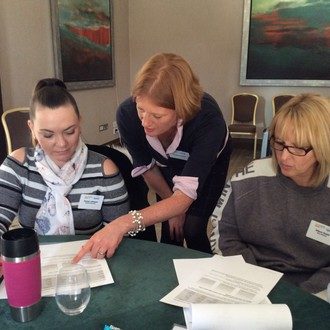Do you voice your opinions or remain silent? Do you say yes to additional work even when your plate is full? Are you quick to judge or blame? Do people seem to dread or fear talking to you?
Many of my clients come to me for coaching with one of their goals to become more assertive. I think we can all do from being a little more assertive at times, so I thought I would write a blog on just this… putting yourself first and becoming more assertive.
Assertiveness is a behaviour that can be learned and developed. It’s a communication process that is a key quality for productive relationships. It can help you move away from feeling passive to feeling more proactive and in turn be listened to more.
It usually involves stepping out of your comfort zone if it’s not your natural way. But by doing so it can empower you, boost your self-confidence and self-esteem.
Assertiveness is not about dominating, resisting or forcing your point of view on others. But it’s the ability to stand up for yourself and to say how you feel when you need to.
Being assertive includes:
- Expressing your own opinion and feelings.
- Saying no without feeling guilty.
- Setting your own priorities i.e. choosing how you spend your time.
- Asking for what you want.
- Being able to take reasonable risks.
- Choosing not to assert yourself at times when you feel it would be better not to say anything.
If you are frequently feeling stressed, then becoming more assertive can help you feel more in control, a key strategy in improving your own stress management. This is especially if you tend to take on too many responsibilities because you have a hard time saying no.
Some people seem to be naturally assertive. But if you’re not one of them, don’t worry because you can learn to be more assertive.
If you would like to harness the power of assertiveness and be able to speak up, engage and problem solve more often there here are my top tips:
-
- Know what you want
This applies to your big picture, so what do you want from your life and career, as well as the specifics of any given situation. Before you act, before you say anything, ask yourself what is the outcome I want? Once you know this, then ask yourself what do I need to do to achieve that result? By knowing what you want and how you are going to achieve it, you will have a better idea of what your next step is going to be.
- Know what you want
-
- Be specific
Don’t beat around the bush, don’t generalise. Making sweeping generalisations is simply a form of communication that is factually incorrect. Think before you speak and use honest and accurate information. So, when you are communicating your opinion, ensure you are being concise and accurate. For example, if you are concerned about the amount of late shifts you are doing, you wouldn’t just say “Why am I doing lates all the time? It’s not fair.” You would instead say, “What are the reasons that I am doing 12 late shifts this month and the other the others are doing eight?”
- Be specific
-
- Ask for more time
If you feel uncomfortable saying no then ask for more time. For example, “I’ll have to see about that”, “let me see if I can realistically build it into my schedule” or a simple “let me think about that and I’ll come back to you”. It is not a crime to ask for more time. In fact, it lets people know you are taking their request seriously.Practice saying no. If you have a hard time turning down requests, try saying, “No, I can’t do that now.” Don’t beat around the bush — be direct. If an explanation is appropriate, keep it brief.
- Ask for more time
-
- Eliminate unassertive words
Unassertive words do nothing for you and your self-esteem. An easy way to practice being more assertive is to start by eliminating the following words –Just – as in I’m just a housewifeOnly – as in I’m only an assistant
Try – as in, I will try and get this back to you
Listen to the words you are using. What other negative words do you frequently use? What could you exchange them for?
- Eliminate unassertive words
-
- Take responsibility for your own communication
Use ‘I’ statements, these let others know what you’re thinking without sounding accusatory. For instance, “I disagree”, rather than, “You’re wrong”. In doing this, it will not only enable you to get your message across in a clear and concise way but also make you think of the words and the meaning of what you are actually saying. It is very easy to say things flippantly without realising the damage a simple phrase can make.
- Take responsibility for your own communication
-
- Observe assertive role models
All successful people have role models so it’s a great idea to observe an assertive person you admire. This could be someone in your family, a friend, a colleague or even somebody you don’t know but really respect. As well as trying to mirror their behaviours, also try to think and feel like them to really take on their persona. Take words from their language, adopt their tone of voice and observe their body language. Act confidently even if you aren’t feeling it. Keep an upright posture, but lean forward a bit. Make regular eye contact. Maintain a neutral or positive facial expression. Don’t wring your hands or use dramatic gestures. Practice assertive body language in front of a mirror or with a friend or colleague. Keep a list of their attributes and add them to your portfolio.
- Observe assertive role models
- Practice
Rehearse what you want to say. If it’s challenging to say what you want or think, practice typical scenarios you encounter. Say what you want to say out loud. It may help to write it out first, too, so you can practice from a script. Consider role playing with a friend or colleague and ask for blunt feedback.Start small. At first, practice your new skills in situations that are low risk. For instance, try out your assertiveness on a partner or friend before tackling a difficult situation at work. Evaluate yourself afterward and tweak your approach as necessary.Keep emotions in check. Conflict is hard for most people. Maybe you get angry or frustrated, or maybe you feel like crying. Although these feelings are normal, they can get in the way of resolving conflict. If you feel too emotional going into a situation, wait a bit if possible. Then work on remaining calm. Breathe slowly. Keep your voice even and firm.
Remember, learning to be assertive takes time and practice. If you’ve spent years silencing yourself, becoming more assertive probably won’t happen overnight.
If despite your best efforts you’re not making progress toward becoming more assertive, consider having some coaching to identify what you want from your life and your career and the steps in order to get it. The payoff will be worth it. By becoming more assertive, you can begin to express your true feelings and needs more easily. You may even find you get more of what you want as a result.
If you would like further information on your next step to becoming more assertive, then please contact me carolyne@carolynecrowe.co.uk or 07500 006383. I would love to hear from you.
Until next time,
Carolyne








